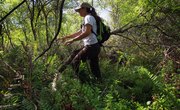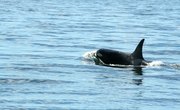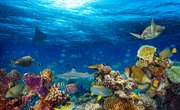Environmental science programs and environmental conservation programs are emerging in colleges and universities throughout the United States. Students interested in participating in up-and-coming environmental fields might have a hard time deciding what courses to take in order to achieve their goal of becoming an environmental scientist or an environmental conservationist.
Environmental Science
The field of environmental science focuses on investigating and analyzing the Earth, and how its waters, atmosphere and biosphere interact with one another. Courses in environmental science focus on understanding our physical world and its processes. Because of the emphasis on processes, students who seek this degree should be prepared to take classes in the physical sciences like chemistry, geology, hydrology, physics and atmospheric science. They are also expected to have a basic understanding of biology and ecology. Students should anticipate some social sciences courses that could include human society, culture, politics or economics.
Environmental Conservation
Environmental conservationists concentrate on policies and management of the environment and its natural resources. Courses for environmental conservation programs will primarily focus on sustaining biological diversity. Graduates are expected to be able to provide information and tools to resolve issues in the environment. Students can expect a program with a strong emphasis on biology and ecology, as well as social science courses focused on the environment. Classes like these might include environmental history, environmental education, green industries and international environmental sustainability.
Similarities and Differences
While environmental conservation is concentrated on human relationships with nature, environmental science seeks to examine natural processes. Both fields make conclusions about natural and human interactions, which means both college programs will include physical science and social science courses. The basic difference in courses is that students of environmental science will learn natural processes, while students of environmental conservation will learn about effects. For example, if a large lake became polluted, environmental scientists would approach the problem by hypothesizing what caused the pollution and what its outcomes would be. They would also determine how the polluted water effects the lake's ecology, and what the long term effects will be. Environmental conservationists would focus their attention on how the pollution affected the lake's ecology, whether the pollutants had a negative or positive effect on the environment, and what the next steps should be.
Career Possibilities
Environmental science and environmental conservation are not two separate fields competing with each other, but the courses that students take will influence what jobs they are qualified for. Environmental scientists will most likely work in labs like environmental engineers. Meanwhile, environmental conservationists will have jobs in the field as wildlife biologists or horticulturalists. Either degree will qualify students for social science jobs like environmental law or environmental education. The “green jobs” market is predicted to grow nearly 20 percent by 2020, and students with a minimum of a bachelor's degree in either environmental science or conservation can expect to participate in that growth.

Related Articles
References
- Environmental Studies for Undergraduate Courses; Dr. Sushmitha Baskar, Dr. R. Baskar
- U.S. Bureau of Labor Statistics: Environmental Scientists and Specialists
- Environmental Career Opportunities: Careers In Environmental Studies
Writer Bio
Kate Stogsdill began writing as a professional student in 2011. She presented several of her papers at student and professional conferences and she also penned cultural and educational reviews on the blog "Serving Tea to Friends." She received a Master of Arts from Georgia State University in history.











